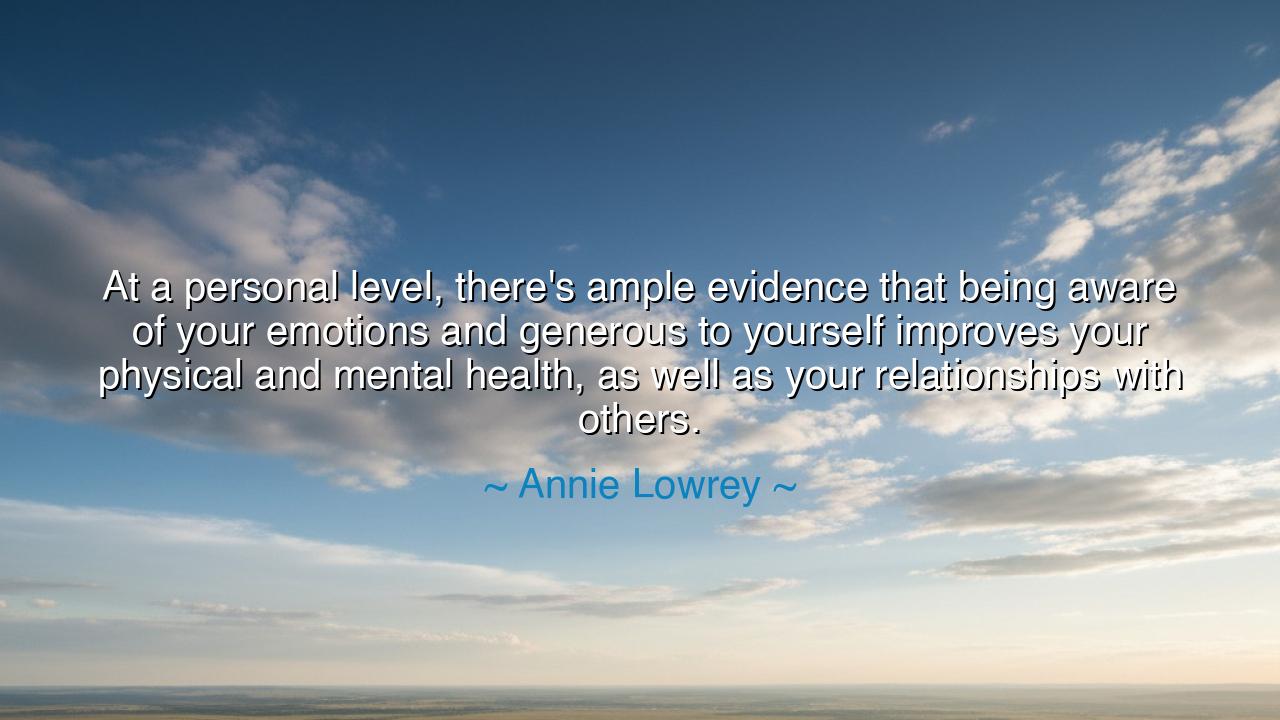
At a personal level, there's ample evidence that being aware of
At a personal level, there's ample evidence that being aware of your emotions and generous to yourself improves your physical and mental health, as well as your relationships with others.






In the quiet hum of modern life, amid the clamor of striving and comparison, Annie Lowrey speaks a truth as ancient as the human heart: “At a personal level, there’s ample evidence that being aware of your emotions and generous to yourself improves your physical and mental health, as well as your relationships with others.” Her words are simple, yet they strike like a bell upon the soul. They call us back to what we have forgotten — that the care of the self is not indulgence, but wisdom; that kindness, when turned inward, becomes the seed from which all peace grows. She reminds us that the awareness of emotion, the gentle acknowledgment of our inner tides, is not weakness, but strength.
To understand her teaching, we must first remember what it means to be aware of emotion. It is to see, without fear, the storms that rise within the heart — the anger, the grief, the envy, the joy. Many flee from these things, mistaking avoidance for mastery. But the ancients knew otherwise. The wise of every age — from the Stoics of Greece to the monks of the East — taught that to know oneself is the first and greatest of victories. For he who names his emotion holds its reins; he who denies it is dragged by it into ruin. Thus, Lowrey’s counsel is no new gospel, but a restoration of the old: that self-awareness is the beginning of both healing and harmony.
She speaks, too, of being generous to oneself — a phrase that sounds soft in the ears of the proud, but is in truth a discipline of the brave. For self-generosity is not the easy comfort of indulgence; it is the hard labor of compassion. It is to forgive oneself for being human, to grant rest when the spirit is weary, to replace judgment with gentleness. Too many souls drive themselves as cruel masters, demanding perfection, scolding failure, and mistaking harshness for strength. But the body withers under such tyranny, and the mind grows ill. The generous heart, on the other hand, restores itself — and in doing so, restores others. For from a kind self flows kindness to the world.
There is a tale from the life of the Buddha that speaks to this truth. When he first sought enlightenment, he practiced such fierce austerity that his body became frail and his mind clouded. He starved himself, denied sleep, punished every desire — believing holiness to be self-denial. But one day, faint and near death, he heard a musician tuning her lute. When the string was too tight, it snapped; when too loose, it made no sound. And in that moment, he understood: the middle way — neither indulgence nor cruelty — is the path of true strength. So he ate, rested, and meditated anew, and soon awakened beneath the Bodhi tree. Thus he discovered what Lowrey echoes in our modern tongue: that gentleness toward oneself is not the enemy of discipline, but its companion.
Modern science, too, now bears witness to this timeless wisdom. The mind that practices self-compassion lowers the storms of stress within the body; the heart that forgives beats stronger, longer. The one who honors their own emotion — who neither buries it nor is ruled by it — builds within themselves a temple of balance. Relationships flourish in such soil, for he who is kind to himself will not demand cruelty from others, nor see every flaw as an offense. The generous soul gives freely because it no longer bleeds from hidden wounds.
But Lowrey’s words also hold a quiet challenge. For in an age that rewards exhaustion and idolizes achievement, to be gentle with oneself can seem like rebellion. The world whispers that worth must be earned — that rest is laziness, and emotion a weakness. Yet the ancients would laugh at such folly. They would say: “You cannot pour from an empty vessel, nor give light if your own flame is dim.” The wise must learn to tend the inner hearth. Only in self-awareness and self-kindness do we find the strength to serve others without losing ourselves.
So, O listener, take this teaching as a compass for your days. When sorrow rises, do not turn away — name it, breathe it, and let it pass through you like wind through the trees. When you fail, do not sharpen the blade of your own tongue — instead, speak to yourself as you would to a beloved friend. Rest when you are weary; forgive when you stumble; celebrate when you rise. In doing so, you will find that your body grows lighter, your mind clearer, your relationships warmer. This is not magic, but the natural harmony of a heart returned to its proper rhythm.
For the lesson of Lowrey’s words is eternal: to master the world, one must first make peace with oneself. Awareness is the lamp; generosity is the oil. Keep both burning, and your light will guide not only your own path but the paths of all who walk beside you.






AAdministratorAdministrator
Welcome, honored guests. Please leave a comment, we will respond soon